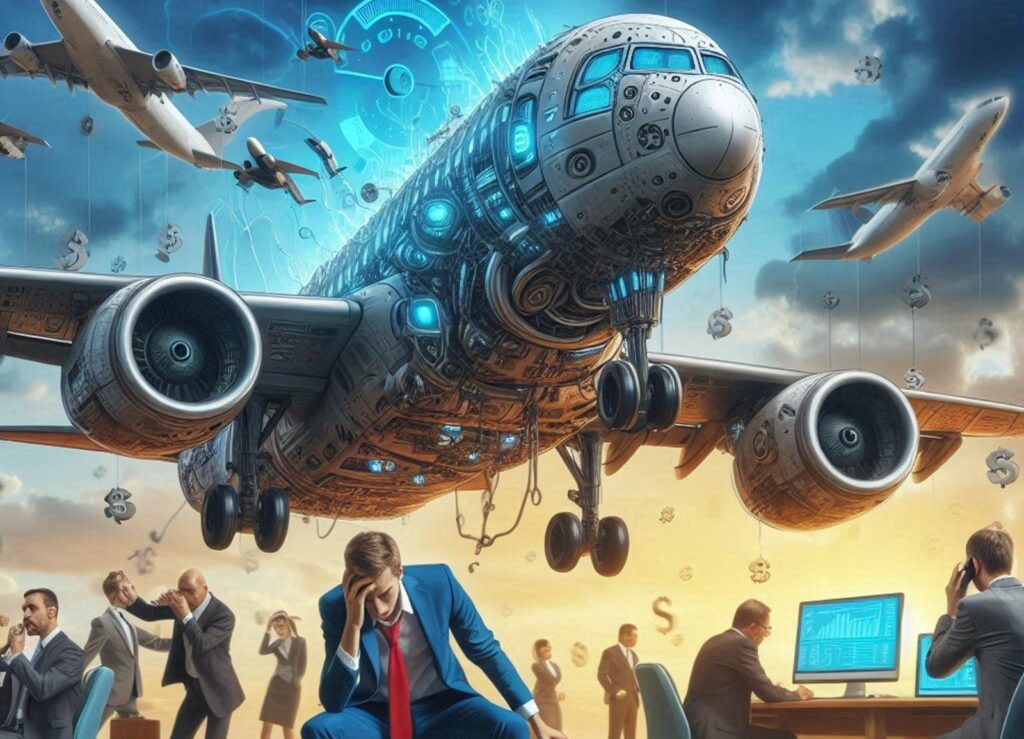
Boeing Boeing … Gone!

Too big to fail became too arrogant to succeed
- Dateline
- 27 July 2034
Earlier today, Wall Street woke up to a shock, and we can just imagine how many investment bankers and fund managers choked on their morning coffee. Boeing, an icon of the skies and a central pillar in many US military projects, halted trading this morning after almost 120 years. The suspension comes after yet another airline had enough and decided it was cheaper to replace their full fleet of Boeing airplanes than wait for another FAA grounding to be cleared.
Walter Croft, CEO of Gamma Airlines, explained their position in very clear language: “Our ability to provide our customers with safe, reliable, and cost-effective flights is paramount. If that means reconfiguring our fleet to only use one airplane manufacturer, so be it!” But Croft and Gamma Airlines have options, as we have seen at last week’s Farnborough International Airshow. At Comac’s pavilion, the line of CEOs of major airlines looking to see what China’s challenge to Boeing and Airbus could offer has grown year after year.
For some, Boeing’s decision did not come as a surprise. The venerable company has struggled with quality issues for a long time, culminating in some spectacularly public failures; two crashes of the Boeing 737 MAX in 2018 and 2019; in 2024, first a door fell off another jetliner midflight, followed by an astronomical escalation (pun intended) when two astronauts got stranded on the ISS for months, due to issues with their Starliner capsule.
Investigations found that not only was quality management lacking across the whole Boeing company, but the corporate culture left much to be desired as well. Several quality enhancing initiatives were introduced after the 737 MAX debacle but didn’t seem to be able to change the trajectory. The late 2020s saw more delivery delays and quality issues, prompting NASA to reallocate critical Artemis Program contracts to SpaceX and ESA, further hastening Boeing’s fall from grace.
After the morning shock, early lunchtime rumours are that GE Aerospace have put in a bid, with the intention of acquiring Boeing and selling off its military and space businesses. Investors will be watching this development with bated breath.
Boeing, involved in everything from civilian aircraft, fighter jets, missiles, and space missions, assumed that they were too big to fail and too well protected by US lawmakers. But when toxic work culture comes up against customer sentiment, all bets are off.
Links to related stories
- Boeing’s Weak Corporate Culture Underlies Difficulties With 737 MAX 9 (forbes.com)
- Boeing’s safety culture is 'inadequate' and 'confusing,' new FAA report finds (nbcnews.com)
- Boeing is closer to understanding thruster failures on its first astronaut flight with latest test (AP News)
- When technology fails to fail – Mindbullets (Dateline 21 March 2016)
Warning: Hazardous thinking at work
Despite appearances to the contrary, Futureworld cannot and does not predict the future. Our Mindbullets scenarios are fictitious and designed purely to explore possible futures, challenge and stimulate strategic thinking. Use these at your own risk. Any reference to actual people, entities or events is entirely allegorical. Copyright Futureworld International Limited. Reproduction or distribution permitted only with recognition of Copyright and the inclusion of this disclaimer.